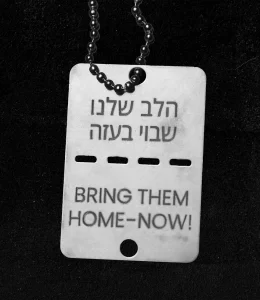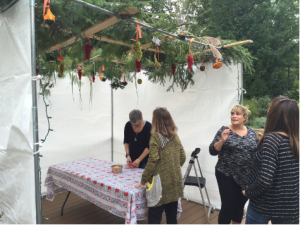Nissim Black delivers his rap Zman Cheruteinu for us to get ready for the message of Passover.
Enjoy and Chag Pesach Sameach!
#BringThemHomeNow
Nissim Black delivers his rap Zman Cheruteinu for us to get ready for the message of Passover.
Enjoy and Chag Pesach Sameach!
#BringThemHomeNow
Naomi Shemer penned this anthem, expressing our longing for the sacredness of Jerusalem. Rabbi Angela Buchdal and Cantor Dan Mutlu share their extraordinary voices to sing Yerushalim Shel Zahav.
May the sacredness and promise of Jerusalem live, peace come to the region, and our hostages are returned home.
Shabbat Shalom
The Prayer, is a duet shared by Cantors Azi Schwartz and Mira Davis. I hope it helps you to enter Shabbat comforted by divinely inspired music and lyrics.
Shabbat Shalom
Let us pray for the hostages scheduled to be returned tomorrow and that those remaining in captivity will come home soon.
#BringThemHome
We offer Eshet Chayil verses from the Book of Proverbs at the Shabbat Table. We are grateful for the “woman of valor,” the specialness of our life partner.
The Shvesters bring these verses to life in a beautiful song.
Shabbat Shalom
#BringThemHome
 One of the horrors of the current war is the holding of the hostages. Their predicament is hopeless because their freedom depends on some level of trust, and there is no trust.
One of the horrors of the current war is the holding of the hostages. Their predicament is hopeless because their freedom depends on some level of trust, and there is no trust.
Israel and Hamas are avowed enemies. Each is dedicated to the destruction of the other. There is no middle ground, no reconciliation, no peace. With this at each core, trust cannot exist.
Hamas has fully embraced the “civilian as a weapon” idea. To give up the hostages means giving up one of its most potent weapons. The hostages have been used as shields, and many believed as a bargaining chip. But without trust, there is no incentive to use this bargaining chip, and once it is used, nothing is left. Hamas does not trust that Israel will live by an agreement; they believe Israel sees an agreement as only the means to obtaining the release of the hostages, nothing more. Once the hostages are returned, Israel will continue to prosecute the war.
Israel has displayed its commitment to destroying Hamas. As Hamas cannot be appeased, it must be eliminated. Israel has a long memory and believes in retribution. It does not trust Hamas. Israel thought it could permit Hamas to exist as it did not pose an existential threat and accepted a tenuous ceasefire. Then, October 7 happened, and whatever trust existed was shattered.
A ceasefire is a lull until it ends, and the warring begins again. This is part of the cynical lack of trust, but it is one of the few things both sides can agree upon.
War is usually fought to capitulation. One side is defeated unequivocally. The victor then dictates the terms of surrender and peace over the vanquished. This may not be possible. But until these two warring parties have more to gain by ceasing hostilities and learning to co-exist, the death and destruction will continue.
I pray that the current negotiations might prove me wrong and that the hostages will be returned. And perhaps peace might be seen as an alternative to hatred and carnage.
 We are about to begin the holiday of Sukkot. From My Jewish Learning, this is an overview of the holiday:
We are about to begin the holiday of Sukkot. From My Jewish Learning, this is an overview of the holiday:
Beginning five days after Yom Kippur, Sukkot is named after the booths or huts (sukkot in Hebrew) in which Jews are supposed to dwell during this week-long celebration. According to rabbinic tradition, these flimsy sukkot represent the huts where the Israelites dwelt during their 40 years of wandering in the desert after escaping from slavery in Egypt. The festival of Sukkot is one of the three great pilgrimage festivals (chaggim or regalim) of the Jewish year.
Here is the link to the full article: https://www.myjewishlearning.com/article/sukkot-101/
By using the Sukkah, we glimpse the experience of our vulnerability.
And this moment of vulnerability requires us to think of those held captive. We pray for and demand the release of the hostages.
We are told to eat at least one meal in the Sukkah. On a lovely fall evening, you can see the stars through the Skach, covering the top. But on cold or rainy evenings, it is another entirely different experience, and we certainly get the message of being vulnerable! (By the way, our great sage, Maimonides, suggests strongly that when it’s rainy, go inside!)
One of the interesting aspects of “dwelling in the Sukkah” is the ritual of inviting the Ushpizin. These are our revered forebears with whom we’d love to talk and glean some of their wisdom. It started with Abraham, Isaac, Jacob, Joseph, Moses, Aaron, and King David. It is extended to include the great matriarchs Sarah, Miriam, Deborah, Hannah, Abigail, Huldah, and Esther. And it is a chance to broaden the guest list even further. I have invited loved ones, particularly my great-grandfather. Who is on your guest list?
As we approach Yom Kippur and Shabbat, may we receive forgiveness and forgive.
W all pray for the hostages to return home and for peace in 5785.
Gmar Chatima Tova and Shabbat Shalom
In response to the 1973 Yom Kippur War and inspired by the Beatles, Let It Be, Naomi Shemer created Lu Yehi, Let it be.
This Shabbat, we continue to pray for the hostages to come home, and for the bloodshed to stop.
Shabbat Shalom
This Shabbat we continue to pray for peace.
My friend and colleague, Cantor Jennifer Duretz Peled, shared this prayer, Ein Milim- There are no words, hoping that the hostages will come home so they would enjoy the peace we envision every Shabbat.
Shabbat Shalom